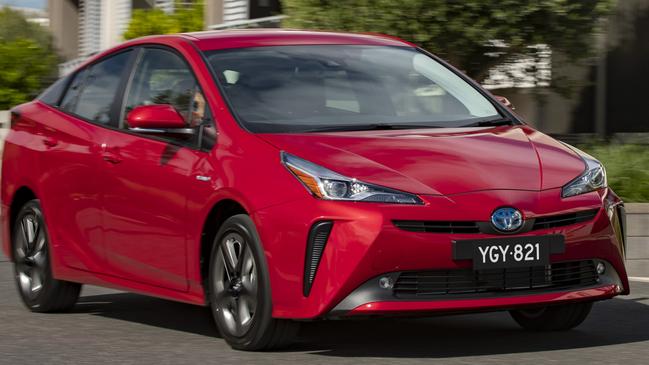Hybrid pioneer Toyota takes a back seat on electric vehicles until prices fall
Hyundai, Nissan, Mitsubishi and Mercedes Benz have EVs or plug-in hybrids and Mazda, Kia and Ford will launch them this year.

Business
Don't miss out on the headlines from Business. Followed categories will be added to My News.
By the end of 2021, seven of the top 10 car brands in Australia will be selling some form of electric vehicle.
There will, however, be one very conspicuous absentee from the race to zero emissions.
Toyota, the brand that pioneered hybrid technology more than 20 years ago with its gawky Prius, is taking a back seat on plug-in vehicles for the time being.
While Hyundai, Nissan, Mitsubishi and Mercedes Benz already have EVs or plug-in hybrids in their local armoury, and Mazda, Kia and Ford will launch them this year, Toyota doesn’t yet have a target local launch date for an EV, although one is expected to enter production overseas some time this year.
Why so late to the party?
Matthew Callachor, the brand’s president and chief executive, says the numbers simply don’t add up for a mass market EV — and won’t for quite some time.
People, he says, will pay an extra $2000 for a hybrid because the economic payback is short-term. But $10,000 or $20,000 is a bridge too far for even the most environmentally aware.
Callachor, a 40-year veteran of the local car industry, believes Toyota can do more for the environment by selling thousands of hybrids rather than a couple of hundred EVs.
“If you look at not so much the high end of the market but the mass market, practically speaking there’s still a distance for battery technology to come, in terms of infrastructure supporting it and also in terms of money,” he says.
He said Toyota was investing huge amounts of time and effort on both battery and fuel-cell technology to address long-term issues, but hybrids remained the most practical short to mid-term solution.
Callachor’s approach will have a significant impact on the uptake of EVs in Australia. Toyota has dominated the local car industry for almost two decades and today Toyotas account for more than one in five new cars sold.
Many rivals claim hybrids are simply a stopgap before the adoption of full electric vehicles, but Callachor isn’t buying that, maintaining they will be a large part of the vehicle mix into the 2030s, particularly at the lower end of the market.
“On a practical, implementable basis now, our focus is let’s get hybrids right because what we can see is that will give an instant benefit to all concerned. It doesn’t mean that Toyota is not interested in battery technology or fuel cell technology, it’s just that there are still barriers towards mass take-up right at this moment,” he says.
Toyota sold a record 54,335 hybrids last year and the RAV4 Hybrid was the No 1 selling vehicle in the country for a couple of months. Almost 70 per cent of RAV4 sales — and more than a quarter of total Toyota sales — were hybrids. In 2017, hybrids made up just 3 per cent of the Toyota fleet.
That’s in stark contrast with industry-wide reported sales of just 1769 EVs, although that figure gives an inaccurate picture because Tesla refuses to publish sales data. Industry guesstimates suggest the brand sold more than 3000 EVs last year.
Callachor says there will be a hybrid version of every Toyota by 2025 and the local operation will evaluate each on a case-by-case basis.
Many have criticised the federal government for not introducing enforceable CO2 targets in line with Europe.
From this year, the EU has mandated that all new passenger cars emit less than 95 grams of CO2 per kilometre. In Australia, there is no mandate, only a voluntary commitment to 100g/km by 2030.
Callachor argues that European standards couldn’t be applied to Australia because of our different vehicle usage needs.
“We have a very big country and we have a lot of off-roading. We have large rural communities, we have mining, a large proportion of agriculture. In Europe it’s highly urbanised and it’s more closely-knit, so our ability to simply have a CO2 reduction target which equals Europe would basically be the end of diesel vehicles,” he said. At the moment there simply wasn’t a viable alternative to diesel work utes.
Originally published as Hybrid pioneer Toyota takes a back seat on electric vehicles until prices fall



